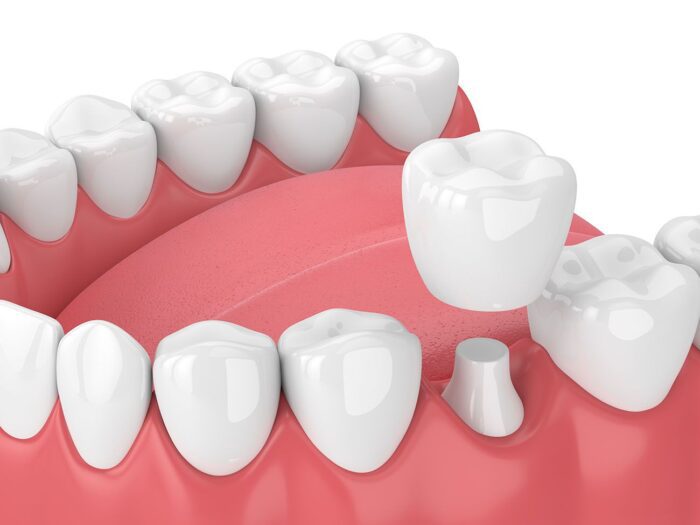Dental crowns are an aesthetic solution for teeth with too much damage. Sometimes, a tooth filling, inlay, or onlay is insufficient to repair the damage.
Dr. Weinstock provides this dental service to his patients who need it. Occasionally, a tooth cracks or breaks because of tooth decay, teeth grinding, an accident, or other reasons. If your dentist cannot repair the damage with other methods, you may need a crown to protect the tooth.

When this occurs, Dr. Weinstock can repair the damaged tooth with a natural-looking porcelain crown. This type of crown blends in well with the opposing teeth. Crowns are color-matched to the color of your natural tooth enamel to provide a natural appearance.
Dr. Weinstock will ensure the crown snugly covers the whole tooth. The crown will add strength, aesthetics, and protection to teeth with damage. Our Philadelphia dentist office will use a crown to:
- Restore damaged, chipped, or cracked teeth
- Disguise discolored teeth
- Correct misshapen teeth
- Reinforce a tooth with a root canal
- Strengthen the anchor teeth for a dental bridge
- As a dental restoration with dental implants
Types of Dental Crowns
With traditional crowns, your dentist will place a porcelain “tooth” that covers a metal cap on top of a tooth remnant. While this method is good for restoring strength and structure to damaged teeth, the edge of the metal cap can show at the gum line. This is not preferable for many patients who want their smile to appear natural.
For this reason, Dr. Weinstock typically uses porcelain-on-metal crowns to repair back teeth. Others cannot see these teeth when you smile or speak. You will benefit from this type of crown’s added strength without worrying about metal showing.
When front teeth become damaged, all-ceramic crowns provide the ultimate option for aesthetically pleasing tooth restoration. They accurately recreate the tooth’s shape and have a translucent appearance, which makes them hard to recognize from natural teeth.
Dr. Weinstock will custom-make your all-ceramic crown to complement the color, size, shape, and texture of your other teeth. His precision and attention to detail ensure natural-looking results. You may even forget which teeth have crowns on them.
Patient Review
About the Dental Crowns Process
The dental crown process is straightforward. Getting a crown on a tooth will take a few weeks to complete. We can typically complete it in two to three dental appointments.
Examination
Dr. Weinstock assesses your teeth and dental health to determine whether a crown is right for you. He looks for signs of decay, stress, and instability that could compromise the results. If a dental crown is the best treatment for your broken tooth, he reviews all your crown options. Then, he creates a custom treatment plan to restore the tooth.
Tooth Preparation
Dr. Weinstock will begin the procedure by using local anesthesia to numb the tooth for your comfort. He will then prepare the tooth by removing a small amount of the natural tooth structure to accommodate the dental crown. If you are anxious about this part of the procedure, we offer dental sedation options to calm nerves. Our goal is to make the treatment as comfortable and pain-free as possible.
Dental Impressions
Next, he will take impressions of the prepared tooth. A dental lab will use them to make a comfortable, beautiful, and natural-functioning crown. Dr. Weinstock will temporarily cap the tooth to protect it until the final restoration is ready. A dental laboratory will create your crown using the impressions and the chosen shade that will best match the rest of your teeth.
Placement of Final Restoration
A dental lab will take about two to three weeks to make your crown. Once we have it, you will return to our Philadelphia dentist office for the final placement of your crown. Dr. Weinstock will remove the temporary cap and then place your new crown. Once you and Dr. Weinstock are happy with the crown’s fit, look, and position, he will bond it to the tooth and polish it.
After Care
You will leave our office with a newly restored smile that functions and looks like the rest of your natural teeth. Patients often experience increased self-confidence after getting a dental crown. You should expect your bite to function better.
Slight sensitivity is common for the first few weeks after getting your crown, but you will adjust. With dental crowns, patients can resume their regular diet and oral care routine shortly after placement.
Dental Crown FAQs
Do you have further questions about dental crowns and how they can benefit and restore your smile? Continue reading to learn more and to find answers to frequently asked questions in our office.
Is it painful when the dentist prepares the tooth for a crown?
No, there is little discomfort during the dental crown procedure. Your dentist will give you a local anesthetic in preparation for your dental crown. You should not experience anything different than receiving a dental filling.
Can you replace my dental crown?
Dr. Weinstock can replace a dental crown if it gets damaged or does not fit well. He will simply remove the old crown and make a new one to protect and restore your tooth. Taking excellent care of your tooth crowns is vital.
You can reduce your risk of replacement or extend the life of your crown with good dental health and by visiting your dentist regularly. If you have concerns about your crown, talk to your dentist to see if he needs to replace it.
Does a dental crown feel any different from a normal tooth?
Initially, you may notice a slight difference in how the tooth feels. However, most people adjust after a few days. If you have any problems with your bite once the dentist places the crown, we can easily adjust it. Please contact our office if you are having issues adjusting.
How long do dental crowns last?
The lifespan of a dental crown depends on several factors. The most vital factors are the material, oral hygiene, and regular dental care. On average, dental crowns can last between 10 and 15 years or even longer with proper care. Proper oral hygiene is vital for caring for your crown to ensure its longevity.
How long does it take to get a dental crown?
The process typically requires two visits to the dentist. During the first visit, we prepare the tooth, take impressions, and place a temporary crown. We will then send the impressions to a dental laboratory, where the permanent crown is custom-made. At the second visit, the dentist will remove the temporary crown and bond the permanent crown to the tooth.
What special things should I do to care for my crown?
Your dental crown should last longer if you take care of it properly. Although the material of your crown will not decay, you can still experience decay where the crown meets your tooth. Because of this, you need to keep up with your normal oral hygiene routine. Regularly brush and floss your teeth and crown just like a natural tooth.
Does insurance cover dental crowns?
Your dental insurance may cover a dental crown. However, every plan is different. Some plans may cover a portion of the cost, while others may cover it entirely. Most plans will not cover a dental crown if it is used for cosmetic purposes.
Check with your insurance provider to see what they include in your plan. Before getting dental crowns, make sure to ask about coverage so you know what to expect regarding payment.
Schedule a Consultation to get a Custom Dental Crown in Philadelphia, PA
Whether you need a new dental crown or an old one replaced, Dr. Weinstock can provide you with a natural-looking restoration. To learn more about getting a dental crown, schedule an appointment with Dr. Weinstock today by calling (215) 857-8054 or requesting an appointment online.
